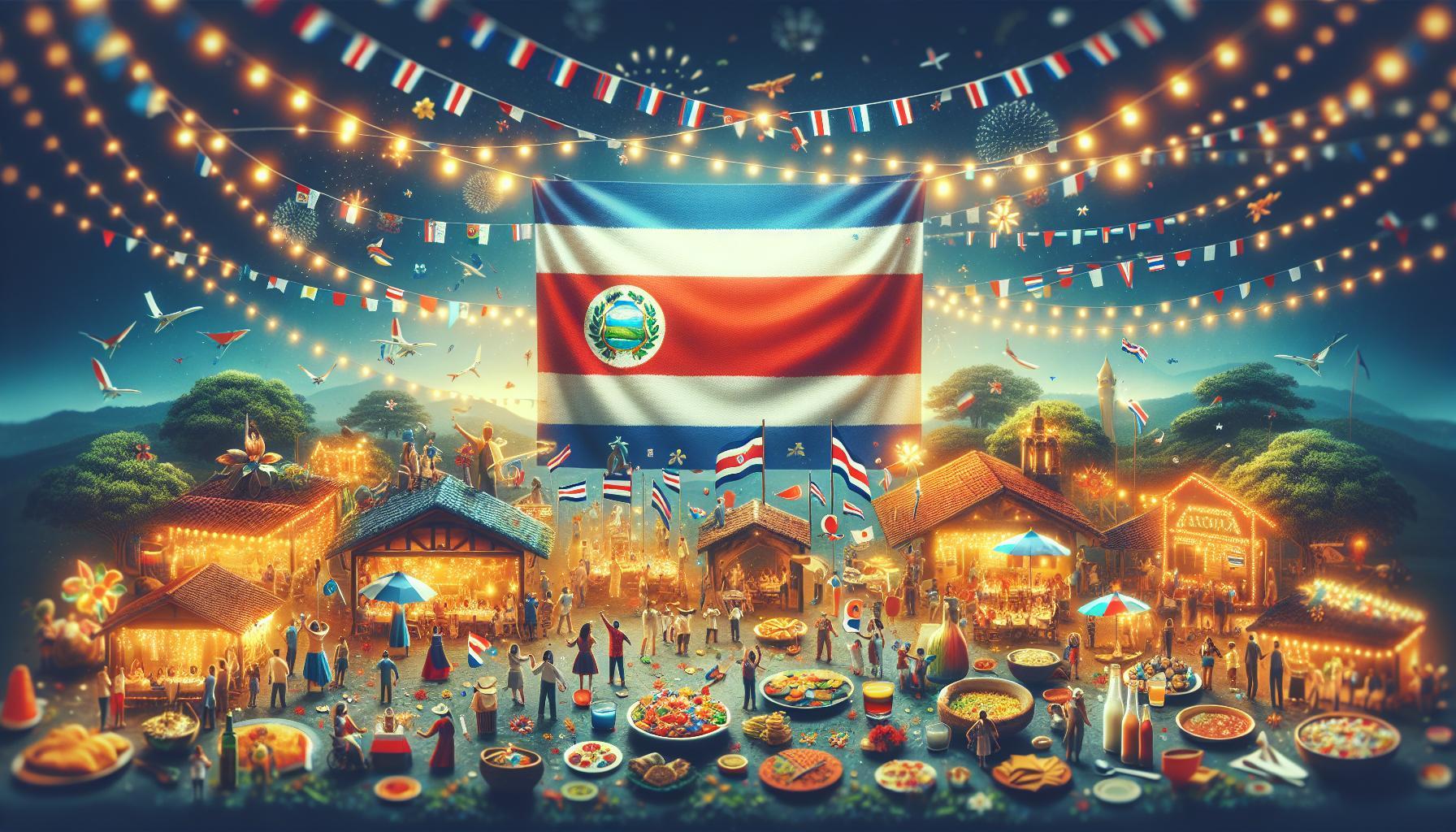Relocating to a new country poses numerous challenges, from navigating immigration rules to finding suitable housing. For those considering a move to Costa Rica, understanding these critical steps is essential for a smooth transition. This guide provides invaluable insights into residency requirements, educational options for families, and practical tips to ensure a successful expat experience in this beautiful Central American paradise.
Why Choose Costa Rica? Discover the Magic of Pura Vida Living
Costa Rica is not just a destination; it’s a lifestyle choice that embodies the essence of happiness, tranquility, and natural beauty. Known for its vibrant culture and warm, friendly people, this Central American gem is increasingly attracting expats seeking a fresh start. Imagine waking up to the sound of tropical birds and the sight of lush rainforests, all while enjoying the famous concept of *pura vida*, a phrase that encapsulates the pure, unhurried essence of Costa Rican life.
Embrace Natural Beauty and Biodiversity
One of the most compelling reasons to consider moving to Costa Rica is its extraordinary biodiversity. The country is home to stunning beaches, majestic mountains, and vibrant ecosystems teeming with wildlife. Many expats find joy in exploring Costa Rica’s national parks, such as Manuel Antonio and Corcovado, which offer lush trails and breathtaking views. Activities like hiking, surfing, and bird-watching allow newcomers to immerse themselves in the natural world.
Quality of Life and Affordable Living
Another significant draw for those evaluating how to move to Costa Rica is the exceptional quality of life afforded by relatively low living costs. The cost of living is often lower than many Western countries, enabling families to enjoy a comfortable lifestyle. Key considerations include:
- Healthcare: Costa Rica boasts a robust healthcare system, with both public and private options offering high-quality services at a fraction of the price compared to the U.S. or Canada.
- Housing: Whether you’re looking for a beachside villa or a cozy apartment in the city, the housing market accommodates a range of budgets.
- Groceries and Dining: Local markets provide fresh produce and traditional foods at much lower prices than in many Western countries, allowing expats to eat healthily without breaking the bank.
For families relocating, Costa Rica’s emphasis on education is also a major advantage. The country offers a range of international schools that cater to various educational philosophies and are equipped to handle expatriate children, ensuring a smooth transition into their new environment.
Community and Integration
Many expats report a strong sense of community and belonging after moving to Costa Rica. The locals are known for their welcoming nature, and expats often find it easy to forge new friendships and integrate into local culture. Additionally, Costa Rica hosts numerous expatriate communities, where newcomers can share experiences and gain valuable insights about adjusting to life in this vibrant country.
In summary, the magic of living in Costa Rica lies not just in its breathtaking landscapes but also in its unparalleled lifestyle advantages. Embracing this *pura vida* way of life means not just moving to a new location but also joining a community that values peace, happiness, and the beauty of nature. Whether you’re interested in exploring the outdoors, enjoying a relaxed pace of life, or providing your family with exceptional educational opportunities, Costa Rica can be the perfect place to call home.
Navigating the Legal Landscape: Visa Options and Residency Requirements
Navigating the legal landscape of Costa Rica involves understanding the various visa options and residency requirements tailored for different circumstances. As the allure of this Central American paradise grows among expats, knowing the right visa pathway to take is crucial for a seamless transition. Whether you’re planning a temporary stay or a permanent move, familiarizing yourself with the legal entry points is an essential step in your relocation journey.
### Visa Options
Costa Rica offers a range of visa categories suitable for different needs. Here are some of the most common options:
- Tourist Visa: Many nationalities can enter without a visa for up to 180 days. Make sure to have a valid passport and proof of onward travel.
- Pensionado Visa: Designed for retirees, applicants must prove a minimum monthly income of $1,000 from a pension or retirement fund.
- Rentista Visa: This option is for individuals demonstrating a continuous monthly income of $2,500 or having a bank deposit of $60,000 to support themselves.
- Digital Nomad Visa: Perfect for remote workers, requiring a monthly income of at least $3,000, this visa allows you to live and work legally from Costa Rica.
### Residency Requirements
Understanding residency requirements is essential for those considering long-term stays or permanent relocation. The criteria vary depending on the type of visa or residency sought.
| Visa Type | Minimum Income Requirement | Key Documents |
|---|---|---|
| Tourist Visa | None (but proof of economic means is required) | Valid passport, proof of return flight |
| Pensionado | $1,000 per month | Proof of income, police clearance |
| Rentista | $2,500 per month or $60,000 deposit | Proof of income/source, bank statement |
| Digital Nomad | $3,000 per month | Proof of employment/income, personal documents |
Taking the time to research and prepare your application can lead to smoother interactions with Costa Rican authorities. Ensure you gather all required documentation and understand the timelines involved in processing your visa or residency. As you embark on this exciting chapter highlighted in guides like “How to Move to Costa Rica: Relocation Guide for Expats,” being proactive about legal requirements will set the stage for a successful transition to life in Costa Rica.
Choosing Your New Home: Best Cities and Neighborhoods for Expats
In the journey of relocating, one of the most exciting aspects is choosing the right place to call home, especially in a vibrant country like Costa Rica. With its stunning landscapes, welcoming culture, and a plethora of activities, the challenge lies in deciding where to settle. Each city and neighborhood offers unique charms and benefits, catering to diverse lifestyles and preferences.
Popular Expat Destinations
Costa Rica boasts several areas that have become havens for expatriates. Here are some of the most favored locations:
- San José: The capital city provides a bustling urban environment with access to amenities, healthcare, and employment opportunities. It serves as the cultural and economic hub of the country.
- Escazú: Known for its upscale residential areas, Escazú is preferred by many expatriates seeking a mix of suburban peace and urban convenience. It’s famous for its shopping malls, restaurants, and social scene.
- Santa Ana: A nearby suburb of San José, Santa Ana offers a more tranquil atmosphere with a strong expat community. It is also home to many international schools, making it ideal for families.
- Nosara: For those who favor a beach lifestyle, Nosara is a sought-after destination known for surfing and yoga. Its laid-back vibe attracts retirees and digital nomads alike.
- Tamarindo: This beach town is popular among both expats and tourists, famous for its vibrant nightlife, stunning beaches, and surfing spots.
Considerations for Choosing Your Neighborhood
When selecting your new home, consider various factors that may impact your living experience. Evaluate the local amenities, such as grocery stores, restaurants, and healthcare facilities. Proximity to social activities and expat communities can significantly enhance your settling-in period. Think about your daily commute and access to public transportation or main roads.
It’s also beneficial to assess the climate and environment of your chosen area. Some regions have a cooler mountain climate, while others boast warm beach weather year-round. Understanding these nuances can help you find the perfect fit for your lifestyle and preferences.
Cost of Living Insights
It’s essential to consider the cost of living in your chosen area. In most cases, expats find that living costs in Costa Rica are significantly lower than in the United States. A brief overview of some living costs is provided in the table below:
| Expense Category | Estimated Monthly Cost |
|---|---|
| Rent (1-bedroom apartment) | $300 – $900 |
| Utilities | $100 – $200 |
| Groceries | $200 – $400 |
| Healthcare | $50 – $100 (per visit) |
With this knowledge and guidance from resources like the “How to Move to Costa Rica: Relocation Guide for Expats,” you can make an informed decision on where to establish your new life in this beautiful country.
Understanding the Cost of Living: Budgeting for Your Costa Rican Adventure
Moving to Costa Rica is an exciting venture, especially when considering the significant savings on daily expenses compared to many Western countries. For expats, understanding the cost of living is crucial in planning a sustainable budget that allows for a comfortable lifestyle while enjoying the beautiful surroundings. With many residents finding that their monthly expenditures can be substantially lower than in their home countries, it’s essential to dissect various components of daily life in this Central American paradise.
Monthly Budget Breakdown
You’ll find that a single individual can typically live comfortably in Costa Rica on a monthly budget of around $1,600 to $2,000. This figure can fluctuate based on lifestyle choices, location within the country, and personal preferences. Couples can expect their combined expenses to start at around $2,000, allowing for a similar standard of living. Here’s a typical breakdown of expenses you might encounter:
| Expense Category | Estimated Monthly Cost |
|---|---|
| Rent (1-bedroom apartment) | $400 – $800 |
| Groceries | $300 – $500 |
| Utilities | $100 – $200 |
| Transportation | $50 – $100 |
| Dining Out | $100 – $300 |
Renting: A Key Consideration
One of the most significant expenses for expatriates often comes from housing. The cost of rent in Costa Rica is about 54.9% lower than in the United States, making it an attractive option for those looking to relocate. For instance, renting a one-bedroom apartment in urban areas can cost between $400 to $800, while prices in rural areas can be even lower. Prioritizing your location according to your lifestyle will be key; urban centers offer more amenities but can be more expensive.
Quality of Life and Budgeting Wisely
With the cost of living being approximately 33.5% lower overall than in the U.S., many expats discover that they can maintain or even enhance their quality of life in Costa Rica with proper budgeting. Tailoring your budget according to lifestyle needs—whether it’s exploring local dining options, engaging in recreational activities, or enjoying the beautiful natural surroundings—can significantly enhance your experience.
Being mindful of your expenditures and adjusting your habits will help ensure that you don’t just survive in your new environment, but thrive. Researching local markets, understanding the transportation system, and taking advantage of expat communities can provide practical insights and help you create a robust financial plan for your new life in Costa Rica.
Embracing the Local Culture: Tips for a Smooth Transition
Adjusting to life in Costa Rica requires not just a change of scenery but a willingness to embrace the vibrant local culture. This Central American gem thrives on a sense of community, celebration, and a slower pace of life that is often quite different from many expats’ home countries. Understanding and participating in local customs, traditions, and even the language can greatly enhance your experience and integration into society.
Learn the Language
Language is one of the most effective tools for connecting with locals. While many Costa Ricans (Ticos) speak English, especially in tourist areas, making an effort to learn Spanish will open doors to deeper interactions. Consider taking classes or engaging a tutor to boost your confidence. Plus, using Spanish phrases in everyday conversations can lead to friendly conversations and friendships.
Participate in Local Events
Costa Rica is rich in festivals and traditions, and participating in these events is a fantastic way to experience the culture firsthand. From lively fiestas celebrating patron saints to colorful parades during national holidays like Independence Day on September 15, getting involved can enhance your understanding and appreciation of the local heritage. Join community events, volunteer for local charities, or even participate in sports; these activities provide excellent opportunities to meet locals and forge connections.
Embrace the ‘Pura Vida’ Lifestyle
A pivotal aspect of Costa Rican culture is the phrase “Pura Vida,” which translates to “pure life.” It embodies a philosophy of simplicity, happiness, and gratitude. Embracing this mindset can help you adjust to the relaxed pace of life in Costa Rica. Instead of focusing on the stresses of everyday life, take time to appreciate the natural beauty around you, engage with your community, and foster a positive outlook.
Understand Local Customs
For a smoother transition, familiarize yourself with local customs and etiquette. Simple gestures, like greeting with a warm “hola” or a handshake, can go a long way. Additionally, being mindful of practices such as tipping (generally 10-15% in restaurants) and respecting personal space will help you navigate social situations with ease.
By incorporating these strategies from the ‘How to Move to Costa Rica: Relocation Guide for Expats’, you can create a richer, more rewarding experience as you adapt to your new home. Embracing local culture will not only make your transition smoother but also lead to lasting friendships and a deeper appreciation of the beautiful Tico way of life.
Finding Your Community: How to Connect with Fellow Expats and Locals
Building a community in a new country is vital for expats looking to settle into their new lives. In Costa Rica, where the vibrant culture and welcoming locals create an inviting atmosphere, finding connections with fellow expats and locals can enhance your experience significantly. Immersing yourself in local traditions and forming friendships can lead to a deeper understanding of the country, making the transition smoother and more enjoyable.
Exploring Local Events
One of the best ways to connect with others is by participating in local events. Costa Rica is rich in cultural festivities, from colorful parades to artisan markets. Here are some ways to get involved:
- Cultural festivals: Attend events like the Fiesta de Palmares or the Festival de la Luz in San José to meet both expats and locals who share your interests.
- Community classes: Join language classes or cooking workshops where you can learn more about Costa Rican culture while meeting others.
- Outdoor activities: Participate in local hiking or surfing groups. The shared experience creates connections and memories with fellow adventurers.
Utilizing Online Platforms
In today’s digital age, utilizing online platforms can be exceptionally beneficial for connecting with others. Consider joining expat forums on social media or dedicated websites that cater to the expat community in Costa Rica. These platforms can provide valuable information, support, and opportunities to meet:
- Facebook Groups: Look for groups focused on expats in Costa Rica or specific regions, where members share advice and organize meetups.
- Meetup.com: Explore local events and activities tailored for expats and locals to mingle and share experiences.
Engaging with Local Communities
Engagement with local communities is crucial for a fulfilling experience. Here are some effective strategies to integrate into Costa Rican society:
- Volunteering: Get involved with local charities or organizations. Serving the community can forge strong relationships and deepen your understanding of the culture.
- Neighborhood gatherings: Attend community meetings or social events in your neighborhood. These gatherings can provide a sense of belonging and offer insight into local customs.
Connecting with others in Costa Rica not only enriches your life but also offers authentic experiences that will make your transition smoother. By engaging with local culture and building connections, you can create a fulfilling chapter in your life as you navigate the exciting journey outlined in the ‘How to Move to Costa Rica: Relocation Guide for Expats.’
Healthcare and Insurance in Costa Rica: What You Need to Know
Costa Rica is renowned for its robust healthcare system, which stands out not only in Central America but also globally. With a strong emphasis on preventive care and universal access, the country boasts a healthcare model that efficiently blends public and private services. Expats looking to relocate can find solace in a system that serves the health needs of approximately 5 million residents, fueled by a commitment to equity and quality care.
Public Healthcare Through the CAJA
At the heart of Costa Rica’s healthcare system is the Caja Costarricense de Seguro Social (CCSS). This government institution administers the public healthcare system, offering a comprehensive range of services to citizens and legal residents. Enrollment in the CAJA is mandatory for residents and provides access to various medical services, including primary care, hospital treatment, and preventive services. Here are some key aspects:
- Membership is funded through contributions from employees, employers, and the government, allowing a sustainable model.
- The CAJA typically covers 100% of costs associated with care if services are provided within the public system.
- While the public healthcare system is renowned for its affordability, waiting times for specialized care can vary.
Private Healthcare Options
While many expats opt for public healthcare, the private sector in Costa Rica is thriving and offers swift access to medical services, often with shorter wait times and specialized care. The quality of private healthcare facilities is high, with many doctors and specialists trained internationally. Here are a few considerations for those contemplating private insurance:
- Private insurance plans can range significantly in cost and coverage, so it’s crucial to research and compare options.
- Private clinics commonly accept international insurance, which simplifies access for expats who retain coverage from their home country.
- Many expats find that the cost of private healthcare, even without insurance, is considerably lower than in countries like the U.S., making it an attractive option for rapid care.
Insurance Requirements for Expats
Navigating health insurance in Costa Rica as an expatriate entails understanding both public and private options. It’s advisable to secure health insurance as a part of your move. Here’s how to approach it:
- Research companies that offer health insurance tailored to expats, ensuring that you understand the coverage limits and services included.
- Consider a combination of public insurance for basic needs and private insurance for quicker access to specialists.
- Ensure that your insurance covers emergencies, as unexpected medical situations can arise, especially in a new environment.
In summary, when considering how to move to Costa Rica, a clear grasp of the healthcare and insurance landscape will aid in a seamless transition. Whether choosing the public system for its cost-effectiveness or the private sector for convenience, expats will find diverse resources to support their health needs in this vibrant country.
Getting Around: Transportation Tips for Exploring Costa Rica
Exploring Costa Rica is a vibrant experience marked by diverse landscapes and rich culture, but navigating the country efficiently can greatly enhance your adventure. Whether you are relocating or just visiting, understanding the various transportation options available is essential to discover the beautiful corners of this Central American paradise. With choices ranging from public buses to private shuttles, knowing your options can make all the difference in your travel experience.
Transportation Options
Several modes of transportation are popular among both locals and tourists in Costa Rica, each suited to different traveling styles and budgets:
- Public Buses: This is one of the most economical ways to get around, with extensive coverage connecting major cities and many remote areas. While buses may not always run on strict schedules, they are an authentic way to experience local life.
- Shuttles: Shared and private shuttle services are a comfortable option, particularly for longer journeys between tourist destinations. These services are affordable and can save you time while providing door-to-door service. For detailed information, check the guide on shuttle services in Costa Rica[[1]]>.
- Car Rentals: Renting a car gives you the freedom to explore at your own pace. Costa Rica’s road infrastructure is generally good, but it’s advisable to invest in a reliable rental that offers necessary insurance and equipment like GPS. For insights on renting a car, refer to this useful guide[[2]]>.
- Ridesharing Services: Apps like Uber are available in major cities, making them a convenient choice for urban travel. However, keep in mind the local regulatory environment when using these services.
Practical Tips for Getting Around
To maximize your mobility and enjoyment during your time in Costa Rica, consider these practical tips:
| Tip | Description |
|---|---|
| Plan Ahead | Check bus schedules and shuttle options in advance, especially during the busy tourist season to avoid long waits. |
| Stay Flexible | Travel times can vary widely due to road conditions. Embrace a flexible schedule to fully enjoy the journey. |
| Learn Basic Spanish | Knowing a few key phrases can enhance your interactions with locals and help you navigate public transport more easily. |
| Safety First | Always ensure your belongings are secure, especially in crowded areas like bus stations. Use official taxi services or rideshares for added safety. |
By familiarizing yourself with these transportation options and tips for getting around, you can ensure a seamless and enjoyable exploration of Costa Rica. Whether it’s the thrill of a scenic drive or the reliability of a pre-booked shuttle, you’ll find that each journey adds to the richness of your experience in this spectacular country.
Schools and Education: Considerations for Families Moving Abroad
When relocating to a new country, understanding the education system is crucial, especially for families with children. In Costa Rica, the education sector is robust, offering a mix of public, private, and international schools that cater to diverse needs. Families can choose among various educational paths depending on their language preferences, educational philosophy, and financial considerations.
Types of Schools in Costa Rica
Families moving to Costa Rica will discover several options for their children’s education:
- Public Schools: Funded by the government and often free of charge, public schools in Costa Rica typically teach in Spanish and follow the national curriculum. While these schools can be a great option for local integration, language barriers may pose challenges for non-Spanish speaking families.
- Private Schools: Offering smaller class sizes and often more resources, private schools can vary significantly in their curriculum and tuition fees. Many private institutions offer lessons in English and follow international standards, making them appealing for expatriates.
- International Schools: These schools are designed for expatriates, providing education based on foreign systems (like American or British curricula) and often teaching in English. They focus on a multicultural environment that is beneficial for global citizens.
Enrollment Process and Requirements
When considering enrollment in a school, it’s important to be aware of specific requirements:
| School Type | Enrollment Process | Requirements |
|---|---|---|
| Public Schools | Contact the local school district | Proof of residency, birth certificate, and previous school records |
| Private Schools | Direct application through the school | Varies by school, typically includes application forms and interviews |
| International Schools | Contact the school for application procedures | Student’s passport, proof of residency, and educational records |
Education Quality and Considerations
Quality varies across schools, so visiting campuses to get a feel for the environment is advisable. Public schools can be underfunded in some areas, while private and international schools often have better facilities and resources. As you navigate through the options, consider factors such as teacher qualifications, student-to-teacher ratios, and extracurricular activities, which enhance educational experiences.
Before making a decision, immerse yourself in the local culture and engage with other expatriate families who can offer insights based on their experiences. Understanding the local education landscape is a significant part of the relocation journey, and investing time in research and visits will ensure your children’s smooth transition as you embark on this adventure.
Frequently asked questions
How to Move to Costa Rica: What Documents Do I Need?
To move to Costa Rica, you need essential documents like a valid passport, proof of income, and a background check. Depending on your residency type, additional documents may be required.
You should prepare a detailed list of required items specific to your visa category. For example, if applying as a pensioner, you’ll need to prove a monthly income from retirement funds. Remember, each document should be authenticated before your arrival to ensure a smooth relocation process.
What is the Cost of Living in Costa Rica for Expats?
The cost of living in Costa Rica can vary, but on average, expats can expect to spend between $1,500 to $3,000 monthly. This includes rent, utilities, and groceries.
Major cities like San José may be more expensive than beach towns. For instance, areas such as Tamarindo are popular among expatriates and offer vibrant community living but may come at a higher cost. It’s essential to budget wisely and keep an eye out for deals on necessities.
Can I Work Remotely in Costa Rica as an Expat?
Yes, you can work remotely in Costa Rica as an expat. Many digital nomads choose this beautiful country for its affordable cost of living and stunning natural landscapes.
Ensure you have a reliable internet connection, which is available in most urban areas. Some expats also use coworking spaces to network and maintain productivity. Additionally, consider obtaining a temporary work permit if you plan to engage in local employment or freelancing.
What is the Healthcare System Like in Costa Rica?
Costa Rica has a well-regarded healthcare system that is both public and private. Most expats find the private healthcare system affordable and of high quality.
Public healthcare, known as Caja, is available to residents and is funded through a system of contributions. However, many expatriates choose private health insurance for faster access to specialists and shorter wait times. Familiarize yourself with local clinics and hospitals to ensure you receive the care you need.
Can I Bring My Pet When Moving to Costa Rica?
Yes, you can bring your pet to Costa Rica, but there are specific requirements. Pets need a health certificate and proof of vaccinations.
One important aspect is that pets must be vaccinated against rabies at least 21 days before travel. Be sure to check with your airline for specific transport rules. To ease your transition, consider connecting with local pet groups once you arrive.
What is the Best Time to Move to Costa Rica?
The best time to move to Costa Rica is during the dry season, which runs from December to April. This period offers pleasant weather, making it easier to settle in.
Planning your move in the dry season can help you avoid challenges posed by heavy rain and flooding during the wet season. It also allows for better exploration of your new surroundings. Remember to account for local holidays which may affect services.
How to Apply for Residency in Costa Rica?
To apply for residency in Costa Rica, you must gather necessary documents and submit an application through the immigration department. Common types include pensionado, rentista, and investor visas.
The application process involves proof of income, criminal background checks, and various fees. It’s advisable to work with an immigration attorney to navigate the complexities of the system efficiently. Once approved, you’ll enjoy various benefits, including access to public services.
Wrapping Up
As you embark on your journey to Costa Rica, remember that this beautiful country offers not just breathtaking landscapes and vibrant culture, but also a welcoming community for expats of all backgrounds. Start by understanding the residency and visa process; securing legal residency can grant you access to invaluable services like public healthcare and a sense of stability in your new home. Gather essential documents—think passports, financial statements, and proof of income—to ease your transition [1[1][3[3].
Engage with the local culture, from savoring the exquisite flavors of traditional dishes to joining in on community festivities, and you’ll soon find yourself feeling at home. Connect with others who have made the leap; their personal stories of adventure and growth are sure to inspire. If you’re imagining yourself lounging on pristine beaches or exploring lush rainforests, know that your dreams are within reach. So pack your bags, prepare for the adventure of a lifetime, and step confidently into your new chapter in Costa Rica. The pura vida lifestyle awaits you! Embrace the journey ahead and dive into the exploration of all that this idyllic paradise has to offer. Happy relocating!






